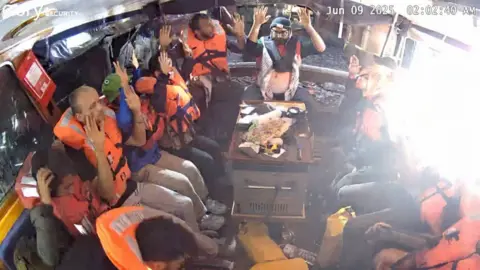The situation in the Middle East has escalated as reports emerge detailing incidents involving an aid ship designating its course towards Gaza. Activists affiliated with the Freedom Flotilla Coalition (FFC) have claimed that Israeli troops have boarded the yacht, purportedly called the Madleen, which was attempting to deliver humanitarian aid. The urgency surrounding this event has been amplified by recent social media posts, wherein the FFC announced a loss of communication with the vessel. This development underscores the intense geopolitical stakes as various countries monitor the movements of both the yacht and the Israeli Navy.
The Madleen, according to reports, is anchored near the Egyptian coast, and among those aboard is prominent climate activist Greta Thunberg. The ship’s mission was to take essential supplies to Gaza, which has faced a significant humanitarian crisis. The FFC indicated that they had anticipated possible Israeli military intervention, fully preparing for such an eventuality. Israeli authorities, however, have justified their military presence in the area, asserting that the navy contacted the yacht to redirect it due to its approach towards a restricted maritime zone.
The Israeli government maintains a strict blockade on Gaza, initially imposed in 2007, claiming it is vital for national security. This blockade is aimed at preventing the transportation of weapons to Hamas, a governing body within Gaza that Israel recognizes as a terrorist group. Israel’s Minister of Defense, Israel Katz, entrenched these assertions, stating through social media that the Israeli Defense Forces (IDF) would take necessary measures to prevent any violation of the blockade, including the act of boarding civilian vessels if deemed necessary.
The argument over the legality of the blockade has been at the forefront of international discourse, with the FFC contending that the naval blockade constitutes a breach of international law. They accused Katz of threatening civilian safety while justifying aggressive military responses as necessary. Press officer Hay Sha Wiya emphasized their commitment to their cause, reinforced by the sentiment that the global community “is watching” the escalating tensions between Israel and those advocating for humanitarian support to Gaza.
The aid contained within the Madleen was reportedly symbolic, comprising basic necessities such as rice and baby formula, aimed at assisting the people of Gaza amid dire circumstances. Additionally, the ship is reported to have a diverse group of passengers from various nationalities including Brazil, France, Germany, the Netherlands, Spain, Sweden, and Turkey, further internationalizing the event.
This latest incident is reminiscent of previous confrontations in which Israel’s military tactics against humanitarian initiatives have been called into question. Notably, the lethal boarding of the Mavi Marmara in 2010, where Israeli commandos killed ten activists, remains indelibly marked in the public consciousness. In the contemporary context, the hands of history highlight the delicate balance between international humanitarian efforts and national security measures that Israel leverages amidst a continued conflict.
As the situation unfolds, humanitarian organizations continue to voice their concerns regarding actions in Gaza. The recent blockade has created severe food scarcity, presenting citizens with a grim dilemma: either to perish from starvation or put their lives at risk for limited access to food resources. Volker Türk, the UN human rights chief, recently articulated this plight, drawing attention to the dire circumstances Palestinians face in the wake of ongoing conflict.
Compounding these incidents is the backdrop of sustained violence, with over 54,880 reported casualties in Gaza since the resurgence of hostilities following the unprecedented Hamas attack on Israel on October 7, 2023. This cycle of violence raises pressing questions about how governments across the globe will respond to allegations of war crimes and military aggression, a response that may bear weight on international relations for years to come.
As the Madleen situation develops, world attention remains fixated on both the humanitarian implications and the complex web of military, political, and social ramifications, encapsulating the essence of the profound unrest that characterizes the Israeli-Palestinian conflict.



